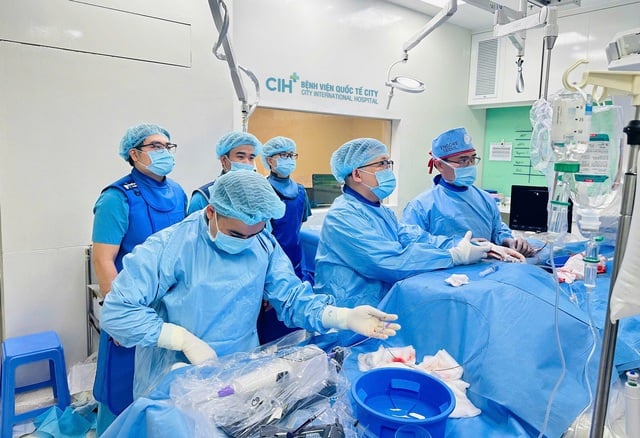On September 14, specialist doctor Le Van Tuyen, Department of Cardiology - Vascular Intervention, City International Hospital, said that the results of the transthoracic echocardiogram showed that Mr. V. had a congenital atrial septal defect causing right ventricular dilatation and pulmonary hypertension. This is a type of congenital heart disease that causes abnormal blood flow between the left and right atria, increasing the burden on the heart and lungs.
According to Dr. Tuyen, if not treated promptly, the disease can lead to heart failure, increased pulmonary arterial pressure, arrhythmias and many other dangerous complications. In fact, many patients only discover the disease when it has progressed severely or accidentally discover it during a routine health check.
At the Department of Interventional Cardiology, the team of doctors performed a transesophageal echocardiogram to accurately assess the patient's condition and decide on the technique of intervening to close the atrial septal defect with instruments.

Doctors successfully intervened in heart disease using atrial septal defect closure technique
PHOTO: TH
Successful intervention in cardiac disease using atrial septal defect occlusion technique
Dr. Tuyen said that this is a minimally invasive procedure, does not require open chest surgery, only local anesthesia. By inserting a catheter from the femoral vein, the doctor brings a small umbrella-shaped device to the right position and closes the hole.
After one day of intervention, the patient's health was stable and he was discharged from the hospital and could return to normal activities.
"A large atrial septal defect can increase the amount of blood returning to the heart, forcing the heart and lungs to work harder. If left untreated, the patient is at risk of complications such as arrhythmia, heart failure, pneumonia or stroke. Compared with open heart surgery, the atrial septal defect closure method has many benefits such as being less invasive, having a faster recovery and fewer complications," Dr. Tuyen shared.
Dr. Tuyen reminded people that regular cardiovascular examinations are important, especially for those who often experience symptoms of fatigue, shortness of breath, chest pain or palpitations. Early detection helps in timely treatment, limiting dangerous complications later.
Source: https://thanhnien.vn/thuong-xuyen-kho-tho-di-kham-phat-hien-di-tat-tim-bam-sinh-18525091110383466.htm






![[Photo] Prime Minister Pham Minh Chinh receives the delegation of the Semiconductor Manufacturing International (SEMI)](https://vphoto.vietnam.vn/thumb/1200x675/vietnam/resource/IMAGE/2025/11/06/1762434628831_dsc-0219-jpg.webp)

































































































Comment (0)